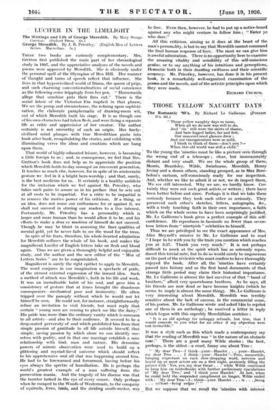LUCIFER IN THE LIMELIGHT
The Writings and Life of George Meredith. By Mary Sturgo. Gretton. (Oxford Press. fis.) George Meredith. By J. B: Priestley.- (Piklish• Men of Letters • Series. Macmillan. 5s.) THESE two books are curiously complenientary. Mrs. Gretton first published the main part of her chronological,
study in 1907, and the appreciative analyses of the novels and poems were approved by Meredith. She is obviously under' the personal spell of the Olympian of Box Hill. Her manner of 'thought and turns of speech reflect that influence. She lives in that hypercivilized world of Diana, the queen of prigs, and such charming conventionalizations of social conscience .
as the following come trippingly from her pen. " Housemaids allege that sunshine -puts their fires out." There is the social fabric of the Victorian Era implicit in that phrase. We see the pomp and circumstance, the refining upon sophisti- cation, the elaborate paraphernalia of drawing-room wit, out of which Meredith built his stage. It is as though one of his own characters had taken flesh, and were living a separate life as critic and appreciator of her creator. The author , certainly is not unworthy of such an origin. Her finely- civilized mind plunges with true Meredithian gusto into book after book, recapitulating the stories, and exhibiting with illuminating verve the ideas and emotions which are hung upon them.
That world of highly-educated leisure, however, is becoming a little foreign to us ; and, in consequence, we feel that Mrs.
Gretton's book does not help us to appreciate the position which Meredith holds to-day amongst an irreverent generation. It 'teaches us much elge, however, for in spite of its aristocratic gesture we feel in it a bright hero-worship ; and that, surely,
is the best medicine for us. - It certainly is a healthy antidote • for the irritation which we feel against Mr. Priestley, who takes such pains to assure us in his preface that he sets out at all costs to be impartial. For a critic to be impartial is to remove the motive power of his criticism. If a thing, or an idea, does not rouse our enthusiasm for or against it, we shall not succeed in stirring our readers to a live interest.
Fortunately, Mr. Priestley has a personality which is
larger and more human than he would allow it to be, and his efforts to make a dens ex machina of himself do not succeed.
Though he may be blunt in assessingthe finer .• qualities of
mental- gold, yet he never fails to see the wood for the trees. In spite of his fears, therefore, his whole-hearted admiration for Meredith suffuses the whole of his book, and makes the magnificent Lucifer of English letters take on flesh and blood again. Thus we are given a thoroughly helpful and enjoyable study, and the author and the new editor of the " Men of Letters Series " are to be congratulated.
Magnificent is surely the right epithet to apply to Meredith.
The word conjures in our imagination a spectacle of pride, of the utmost external expression of the inward idea. Such
a method of attack was Meredith's, both in his life and work. It was an ineradicable habit of his soul, and gave him a consistency of gesture that at times brought the disastrous consequences—mechanical pose and insincerity. He often tripped over the panoply without which he would not let himself be seen. He could not, for instance, straightforwardly refuse an invitation to visit friends, but must reply that certain " young men are coming to pluck me like the daisy."
His pride was more than the ordinary vanity which is common to all artists—and also to their audience. It seemed to be a deep-seated perversity of soul which prohibited him from that simple passion of gratitude to all life outside himself, that simple, saving passion by which alone we can identify our- selves with reality, and in that one marriage establish a sane relationship with God, man and nature. His demoniac powers of minute observation were used to build up a glittering and myriad-faced universe which should reflect to his apprehensive soul all that was happehing around him. He had to be forewarned and forearmed, having before his eyes always the spectre of humiliation. He is perhaps the world's greatest example of a man suffering from the persecution mania. And the tragedy of his disease was that the taunter lurked in the eye of every corner. Only perhaps when he escaped to the Woods of Westermain, to the company of squirrels, ferns, bawls, and the striding south-wester, was
he free. Even then, however, he had to put up a notice-board against any who might venture to follow him : " Enter ye who dare."
All this criticism, aiming as it does at the heart of the man's personality, is but to say that Meredith cannot command the final human response of love.. The Most we can give him is aweful admiration. There is no.opportunity here to examine the amazing vitality 'and sensibility of this self-conscious genius, or to say anything of his intuitions and perceptions,. Hermetic both in their dazzling swiftness and their scientific accuracy. Mr. Priestley, however, has done it in his present book, in a remarkably well-organized examination of the poems and the novels, and of the artistic principles upon which they were made.
RICHARD Cnunar.










































 Previous page
Previous page